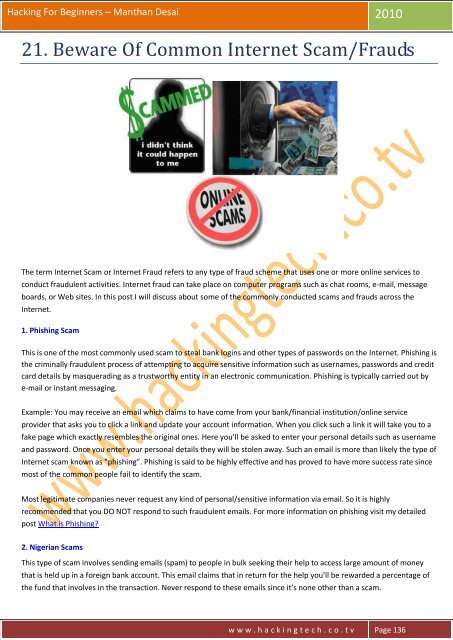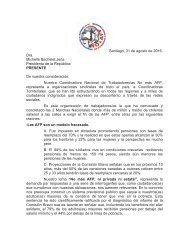- Page 2 and 3:
Hacking For Beginners - Manthan Des
- Page 4 and 5:
Hacking For Beginners - Manthan Des
- Page 6 and 7:
Hacking For Beginners - Manthan Des
- Page 8 and 9:
Hacking For Beginners - Manthan Des
- Page 10 and 11:
Hacking For Beginners - Manthan Des
- Page 12 and 13:
Hacking For Beginners - Manthan Des
- Page 14 and 15:
Hacking For Beginners - Manthan Des
- Page 16 and 17:
Hacking For Beginners - Manthan Des
- Page 18 and 19:
Hacking For Beginners - Manthan Des
- Page 20 and 21:
Hacking For Beginners - Manthan Des
- Page 22 and 23:
Hacking For Beginners - Manthan Des
- Page 24 and 25:
Hacking For Beginners - Manthan Des
- Page 26 and 27:
Hacking For Beginners - Manthan Des
- Page 28 and 29:
Hacking For Beginners - Manthan Des
- Page 30 and 31:
Hacking For Beginners - Manthan Des
- Page 32 and 33:
Hacking For Beginners - Manthan Des
- Page 34 and 35:
Hacking For Beginners - Manthan Des
- Page 36 and 37:
Hacking For Beginners - Manthan Des
- Page 38 and 39:
Hacking For Beginners - Manthan Des
- Page 40 and 41:
Hacking For Beginners - Manthan Des
- Page 42 and 43:
Hacking For Beginners - Manthan Des
- Page 44 and 45:
Hacking For Beginners - Manthan Des
- Page 46 and 47:
Hacking For Beginners - Manthan Des
- Page 48 and 49:
Hacking For Beginners - Manthan Des
- Page 50 and 51:
Hacking For Beginners - Manthan Des
- Page 52 and 53:
Hacking For Beginners - Manthan Des
- Page 54 and 55:
Hacking For Beginners - Manthan Des
- Page 56 and 57:
Hacking For Beginners - Manthan Des
- Page 58 and 59:
Hacking For Beginners - Manthan Des
- Page 60 and 61:
Hacking For Beginners - Manthan Des
- Page 62 and 63:
Hacking For Beginners - Manthan Des
- Page 64 and 65:
Hacking For Beginners - Manthan Des
- Page 66 and 67:
Hacking For Beginners - Manthan Des
- Page 68 and 69:
Hacking For Beginners - Manthan Des
- Page 70 and 71:
Hacking For Beginners - Manthan Des
- Page 72 and 73:
Hacking For Beginners - Manthan Des
- Page 74 and 75:
Hacking For Beginners - Manthan Des
- Page 76 and 77:
Hacking For Beginners - Manthan Des
- Page 78 and 79:
Hacking For Beginners - Manthan Des
- Page 80 and 81:
Hacking For Beginners - Manthan Des
- Page 82 and 83:
Hacking For Beginners - Manthan Des
- Page 84 and 85:
Hacking For Beginners - Manthan Des
- Page 86 and 87: Hacking For Beginners - Manthan Des
- Page 88 and 89: Hacking For Beginners - Manthan Des
- Page 90 and 91: Hacking For Beginners - Manthan Des
- Page 92 and 93: Hacking For Beginners - Manthan Des
- Page 94 and 95: Hacking For Beginners - Manthan Des
- Page 96 and 97: Hacking For Beginners - Manthan Des
- Page 98 and 99: Hacking For Beginners - Manthan Des
- Page 100 and 101: Hacking For Beginners - Manthan Des
- Page 102 and 103: Hacking For Beginners - Manthan Des
- Page 104 and 105: Hacking For Beginners - Manthan Des
- Page 106 and 107: Hacking For Beginners - Manthan Des
- Page 108 and 109: Hacking For Beginners - Manthan Des
- Page 110 and 111: Hacking For Beginners - Manthan Des
- Page 112 and 113: Hacking For Beginners - Manthan Des
- Page 114 and 115: Hacking For Beginners - Manthan Des
- Page 116 and 117: Hacking For Beginners - Manthan Des
- Page 118 and 119: Hacking For Beginners - Manthan Des
- Page 120 and 121: Hacking For Beginners - Manthan Des
- Page 122 and 123: Hacking For Beginners - Manthan Des
- Page 124 and 125: Hacking For Beginners - Manthan Des
- Page 126 and 127: Hacking For Beginners - Manthan Des
- Page 128 and 129: Hacking For Beginners - Manthan Des
- Page 130 and 131: Hacking For Beginners - Manthan Des
- Page 132 and 133: Hacking For Beginners - Manthan Des
- Page 134 and 135: Hacking For Beginners - Manthan Des
- Page 138 and 139: Hacking For Beginners - Manthan Des
- Page 140 and 141: Hacking For Beginners - Manthan Des
- Page 142 and 143: Hacking For Beginners - Manthan Des
- Page 144 and 145: Hacking For Beginners - Manthan Des
- Page 146 and 147: Hacking For Beginners - Manthan Des
- Page 148 and 149: Hacking For Beginners - Manthan Des
- Page 150 and 151: Hacking For Beginners - Manthan Des
- Page 152 and 153: Hacking For Beginners - Manthan Des
- Page 154 and 155: Hacking For Beginners - Manthan Des
- Page 156 and 157: Hacking For Beginners - Manthan Des
- Page 158 and 159: Hacking For Beginners - Manthan Des
- Page 160 and 161: Hacking For Beginners - Manthan Des
- Page 162 and 163: Hacking For Beginners - Manthan Des
- Page 164 and 165: Hacking For Beginners - Manthan Des
- Page 166 and 167: Hacking For Beginners - Manthan Des
- Page 168 and 169: Hacking For Beginners - Manthan Des
- Page 170 and 171: Hacking For Beginners - Manthan Des
- Page 172 and 173: Hacking For Beginners - Manthan Des
- Page 174 and 175: Hacking For Beginners - Manthan Des
- Page 176 and 177: Hacking For Beginners - Manthan Des
- Page 178 and 179: Hacking For Beginners - Manthan Des
- Page 180 and 181: Hacking For Beginners - Manthan Des
- Page 182 and 183: Hacking For Beginners - Manthan Des
- Page 184 and 185: Hacking For Beginners - Manthan Des
- Page 186 and 187:
Hacking For Beginners - Manthan Des
- Page 188 and 189:
Hacking For Beginners - Manthan Des
- Page 190 and 191:
Hacking For Beginners - Manthan Des
- Page 192 and 193:
Hacking For Beginners - Manthan Des
- Page 194 and 195:
Hacking For Beginners - Manthan Des
- Page 196 and 197:
Hacking For Beginners - Manthan Des
- Page 198 and 199:
Hacking For Beginners - Manthan Des
- Page 200 and 201:
Hacking For Beginners - Manthan Des
- Page 202 and 203:
Hacking For Beginners - Manthan Des
- Page 204 and 205:
Hacking For Beginners - Manthan Des
- Page 206 and 207:
Hacking For Beginners - Manthan Des
- Page 208 and 209:
Hacking For Beginners - Manthan Des
- Page 210 and 211:
Hacking For Beginners - Manthan Des
- Page 212 and 213:
Hacking For Beginners - Manthan Des
- Page 214 and 215:
Hacking For Beginners - Manthan Des
- Page 216 and 217:
Hacking For Beginners - Manthan Des
- Page 218 and 219:
Hacking For Beginners - Manthan Des
- Page 220 and 221:
Hacking For Beginners - Manthan Des
- Page 222 and 223:
Hacking For Beginners - Manthan Des
- Page 224 and 225:
Hacking For Beginners - Manthan Des
- Page 226 and 227:
Hacking For Beginners - Manthan Des
- Page 228 and 229:
Hacking For Beginners - Manthan Des
- Page 230 and 231:
Hacking For Beginners - Manthan Des
- Page 232 and 233:
Hacking For Beginners - Manthan Des
- Page 234 and 235:
Hacking For Beginners - Manthan Des
- Page 236 and 237:
Hacking For Beginners - Manthan Des
- Page 238 and 239:
Hacking For Beginners - Manthan Des
- Page 240 and 241:
Hacking For Beginners - Manthan Des
- Page 242 and 243:
Hacking For Beginners - Manthan Des
- Page 244 and 245:
Hacking For Beginners - Manthan Des
- Page 246 and 247:
Hacking For Beginners - Manthan Des
- Page 248 and 249:
Hacking For Beginners - Manthan Des
- Page 250 and 251:
Hacking For Beginners - Manthan Des
- Page 252 and 253:
Hacking For Beginners - Manthan Des
- Page 254 and 255:
Hacking For Beginners - Manthan Des



